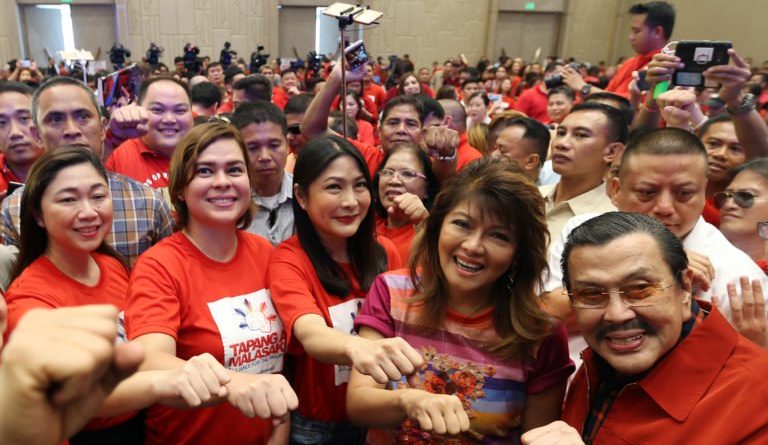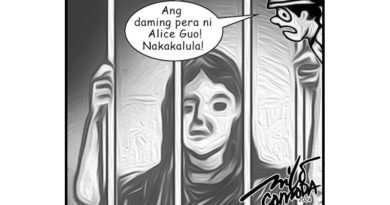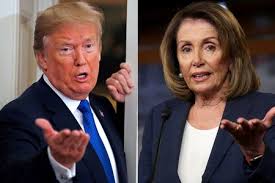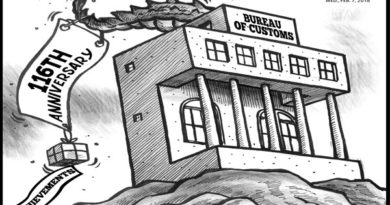OP ED COLUMN: OPINION ON PAGE ONE – The rise of Mayor Sara and the cry vs dynasties
ONE of the real demands for urgent constitutional change is the end of “political dynasties.” Yet the actual effort to strengthen their foothold in Philippine society tends to intensify even as the call against them ratchets up. What we denounce by words, we tend to support by our deeds. And we rarely notice the contradiction or the difference.
Section 26, Article II of the Constitution provides, “The State shall guarantee equal access to opportunities for public service, and prohibit political dynasties as may be defined by law.” But our electoral politics has become the most remunerative business for many, and “equal access to opportunities for public service” has become nothing but “equal access to opportunities for graft.”
So until now no implementing law defines “political dynasties” and prohibits their baneful existence.
My take on dynasties
I have long fought political dynasties. In 1978, while I was in the Cabinet, I entered electoral politics in order, primarily, to curb a local political dynasty which, in my view, had done enough mischief in office. Having succeeded in that, I made myself and my constituents a solemn promise that for as long as I was in politics, no kinsman of mine would seek political office on the basis of their being my relative. All my relatives helped me keep my word, and none of them entered politics on that account until now.
Still, I am not entirely convinced there is an unimpeachable moral basis for a constitutional ban on members of the same family going into politics at the same time. Since there is no law that prohibits the sons and daughters or spouse of a lawyer, doctor, engineer, chemist or any other professional from practicing the same profession, no law should bar the spouse or children of a politician from following a man’s decision to be in politics. In any case, one does not become a politician simply by deciding to become one; he or she has to be voted into office by responsible voters in order to become one.
This has not been adequately articulated, but it is obviously one of the reasons no enabling law on the anti-dynasty prohibition has been enacted. But it should be possible for us to agree, as a civilized community, that in a Senate of 24 members, a provincial board, city, municipal or barangay council of so many members, we cannot and should not have two members of the same family sitting together at the same time.
In a country of 20 million or so families (100 million people), it should be honor and distinction enough for a family to have one of its members occupying one of the 24 Senate seats at any one time; why should one particular family, even if it had the monopoly of all the brains, moral virtues and good looks, have more than one member sitting there at the same time?
In 2007, as a member of the Opposition, I said I could not abide the idea of Koko Pimentel, Alan Peter Cayetano and JV Ejercito Estrada running for the Senate while their closest blood relatives — Sen. Aquilino Pimentel Jr. (Koko’s father), Pia Cayetano (Alan’s sister) and Jinggoy Estrada (JV Ejercito’s half-brother) — were sitting in the Senate at the same time.
Although I was on friendly terms with all the personalities involved, I felt so strongly about the ethical principle that I decided not to run for the Senate in that election. Then President Estrada’s response, as party leader, was to withdraw JV’s candidacy, but he did nothing to stop Koko and Alan Peter from running — and both eventually won.
This prompted some of Erap’s closest allies to remark that had I not intervened, JV Ejercito would have been elected as well. I could find no words to express my disappointment over their failure to grasp the principle involved. Erap corrected his “mistake” after that election, and JV eventually joined his half-brother Jinggoy as a fellow senator.
Now both are reportedly poised to run together in the next election. I can only hope that one of them would give way in consideration of the sensibility of the public.
Sara’s Hugpong and DU30’s dynasty
But the dynasty issue comes alive this time not because of JV or Jinggoy, but because of the unbridled efforts of some politicians to promote one particular dynasty. This is the Duterte dynasty, fueled by Mayor Sara Duterte-Carpio’s “Hugpong ng Pagbabago,” a Davao-based regional political party, which many politicians now see as the key to their success in the 2019 elections.
While the anti-dynasty cry persists, more and more groupings are seen swarming into Mayor Sara’s camp, even before they could fully grasp the meaning of the Visayan word “hugpong” (“union” in English). It is an awkward replay of what happened in 2016, except in the opposite direction.
Two years ago, politicians of various shades deserted their original political parties in order to follow President DU30 into the three-member PDP-Laban, whose president, Sen. Aquilino “Koko” Pimentel 3rd, he had installed as Senate President for being a Mindanaoan, and whose other member, Rep. Pantaleon Alvarez, he had installed as Speaker, for being also a Mindanaoan.
As the dominant ruling party., PDP-Laban went to the extent of entering into an alliance with the Chinese Communist Party, in apparent support of DU30’s pivot to China and his declared intention to run a coalition government with the communists, some of whom he had already appointed to the Cabinet, beginning with Cabinet Secretary Leoncio Evasco Jr. a former priest and communist, vice chairman of the National Democratic Front (NDF).
But Pimentel and Alvarez were eventually deposed. Pimentel was replaced by Sen. Vicente Sotto 3rd, and Alvarez, by Pampanga Rep. and former President Gloria Macapagal Arroyo, whom he had earlier removed as Deputy Speaker of the House. Then the massive exodus from PDP-Laban and the nearly mechanical migration to Inday Sara’s Hugpong ng Pagbabago followed.
Three national political parties and six local groups are reported to have entered into an alliance with Hugpong ng Pagbabago. Outside of the Mindanao-based local groups, these parties have no compelling reason to enter into an alliance with this regional party now. Nor are they expected to benefit from such alliance in the next elections. The only ones who could expect to do so are Ilocos Norte Gov. Imee Marcos, Taguig Rep. and former senator Pia Cayetano, and somebody from the VIllar (NP) or the Cojuangco (NPC) family, who may be running for the Senate next year.
The alliance will only fully come into play for everybody in 2022, when DU30 steps down and anoints his daughter Sara, assuming the rules do not change, as his preferred successor. This is also when DU30’s “political dynasty” becomes a real concern, and Hugpong ng Pagbabago and its various party-allies could play a vital role in the search for a possible successor.
Aside from DU30’s Mindanao political base, Hugpong ng Pagbabago is expected to draw its following from the amorphous crowd which Cabinet Secretary Evasco Jr., had tried to put together in “Kilusang Pagbabago” and “Masa Masid,” under his ambitious program to turn the Philippines into a socialist state. That program has obviously failed, and the rebel ex-priest, who has been running DU30’s operations as president and commander in chief, is reportedly preparing to run for governor of Bohol, where he had served as mayor of the town of Maribujoc.
Post-DU30 agenda
This, and Mayor Sara’s focus on Hugpong ng Pagbabago, appear to give the clearest indication that DU30 is about to concede that his brave efforts to pursue a constitutionally, politically and economically flawed federalism and other ambitious projects are, for all intents and purposes, lost, and that he must now prepare for what is to come with the help of his most trusted next of kin.
With a lot of foresight, Sara has begun to plan post-DU30. And she may have decided to prepare for the next political battle as a purely constitutional and electoral battle which would require her to depend on a strong political party instead of any zany ideas.
To the extent that she does not repeat her father’s reckless soliloquies on revolutionary government, martial law, and Xi Jinping protecting him from being overthrown by hostile Filipinos, to that extent we can perhaps expect the apple to fall not too close to the tree. If DU30 lasts until the bell rings and Sara emerges as a player in 2022, we should be able to reasonably look forward to a fairer electoral contest, where the winner would be chosen authentically by the Filipino voters instead of that villainous beast called Smartmatic or Cambridge Analytica.
This is a vision worth pursuing, but we must realize we cannot have it for free. There is a price to be paid. We need to take serious things seriously. We need to thoroughly clean up our electoral system, establish genuine and responsive political parties, and educate ourselves — leaders and the common people alike — to give the highest meaning and value to our being a constitutional democracy, or better yet a God-fearing and law-abiding Christian democracy.
 All photographs, news, editorials, opinions, information, data, others have been taken from the Internet ..aseanews.net | [email protected] |.For comments, Email to :D’Equalizer | [email protected] | Contributor
All photographs, news, editorials, opinions, information, data, others have been taken from the Internet ..aseanews.net | [email protected] |.For comments, Email to :D’Equalizer | [email protected] | Contributor










